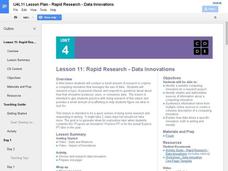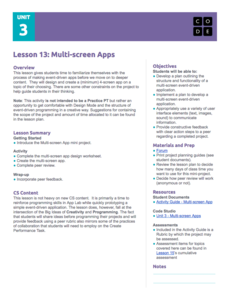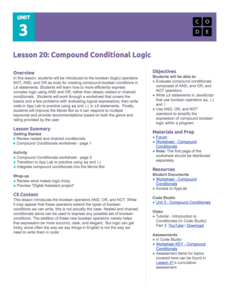Curated OER
Using Google Squared to Compare and Contrast Canada and the US
Sixth graders compare and contrast Canada and the United States. In this geography skills instructional activity, 6th graders use Google Squared to research information so that they may compare the geography of Canada and the United States.
Code.org
Image Scroller with Key Events
Discover how to embed images in lists. Scholars modify an existing app to include an image scroller in the 17th lesson of the series. They learn to refactor code and remove redundancies after modifying code.
Library Sparks
Reference Tools Vocabulary Challenge
Students love the opportunity of going to the library to jump into that one comfy chair in the whole room with a book, or be a lucky one to get to the computers before anyone else. But knowing how to locate books and other reference...
Curated Video
Safety Mode
Teach your YouTube users how to protect themselves from offensive content with a mini lesson on Safety Mode. The teacher presents information about Safety Mode, and then demonstrates how it can be turned on and off. Learners try on their...
Code.org
The Cost of "Free"
Explore the trade-offs of using a free app. The fourth installment of a 12-part unit helps young consumers discover the cost of receiving a free service. They learn how these apps make use of their access to data.
Code.org
One-way Functions – The WiFi Hotspot Problem
Pupils attempt to solve the Wireless Hotspot Problem and learn why it is considered a computationally hard problem in the ninth lesson of the series on 12. They also learn about one-way functions and how the Wireless Hotspot Problem is...
Code.org
The Need for Encryption
Scholars investigate the need for encryption as they read a portion of the book Blown to Bits and discuss encryption techniques. They finish by attempting to decode a message written using a Caesar cipher.
Code.org
Cracking the Code
Scholars learn how to crack secret codes as they continue reading from the Blown to Bits and try to crack the random substitution cipher. They also begin learning about the Vigenere cipher.
Code.org
Rapid Research – Data Innovations
Scholars conduct research into a computing innovation of their choice and figure out how it uses data. They prepare brief reports of their research in the second installment of the series.
Curriculum Corner
Websites to Remember
Keep track of all your favorite sites with this handy record page. Included here are two PDF versions (one in black and one in blue), and two Word document versions that you can use to type in the site information.
Curated OER
Estuary and Watershed
Students investigate the San Francisco Bay Estuarine Research Reserve and watershed. In this estuary and watershed lesson plan, students complete 4 activities to better understand estuarine systems. They include studying the San...
Google
History of Math Lesson Plan
Learners honor mathematicians who have contributed important discoveries throughout history by researching and creating a report about a famous mathematician and their contributions to the history of mathematics. Pairs of learners create...
Code.org
Processing Arrays
Scholars use a playing card activity to help them develop a program to find the minimum value of a list. They learn to use for loops to write code that will process lists.
Code.org
Canvas and Arrays in Apps
Scholars learn how to make a digital canvas and fill it with artwork by creating a drawing app using the canvas element. The activity requires learners to previous knowledge of arrays and return commands to draw images.
Code.org
Practice PT – Improve Your App
The last installment of a 21-part unit is a practice performance task that asks class members to design an app using skills from the unit. Scholars take one of the previous apps from the unit and modify it by adding elements and making...
Code.org
Multi-screen Apps
Scholars continue their study of event-driven programming by creating a multi-screen app in the fifth lesson of the series. They incorporate previously learned elements and events in the mini-project.
Code.org
Introduction to Conditional Logic
On one condition ... explore how to use conditionals within conditionals. Scholars apply conditional statements to improve upon the app they built during a previous lesson. They also learn about nested conditionals in the 11th lesson of...
Code.org
Event-Driven Programming and Debugging
Start programming in event-driven style. Scholars learn to place buttons on the user interface and use event handlers. They also learn to recognize errors in code and debug as necessary. This is the second lesson in the series of 21.
Code.org
Beyond Buttons Towards Apps
Explore how people use event-driven programming in games with a lesson that teaches scholars to use new screen elements and events. They apply these new elements to create a simple chaser game.
Code.org
Compound Conditional Logic
Scholars explore compound conditional logic and learn to use the Boolean operators AND, OR, and NOT within conditional statements by incorporating these operators to improve a previously created app.
Code.org
While Loops
Bring your pupils in the loop with while loops. Scholars learn how to modify conditional statements to produce while loops in the 14th lesson of the series. They use flowcharts to understand loops and then program some examples of loops.
Code.org
Identifying People with Data
How much information about you is out there? Scholars explore this question as they investigate data breaches and how these violations occur. They then take part in an activity where they research how easily people could get access to...
Curated OER
Colonial Newspaper Template
Partners produce a colonial newspaper that includes news articles, advertisements, want ads, and more using this handy template.
Code.org
Public Key Cryptography
Investigate how public key cryptography works. Scholars continue their study of one-way functions and asymmetric keys and apply this information to public key cryptography. They use an app to explore public key cryptography and its...

























